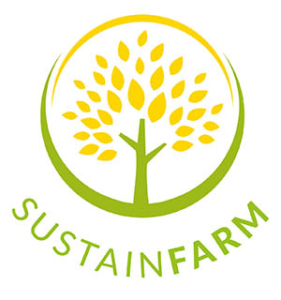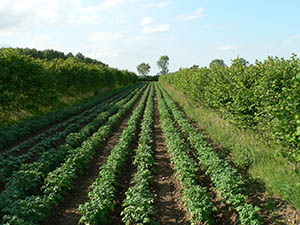
Acronym : SustainFARM
Contract Period : 01/03/2016 - 31/03/2019
Project Webpage : http://www.sustainfarm.eu/en/
Main Funder : Defra and FACCE SURPLUS
ORC Staff Contact : Jo Smith

The main objective of SustainFARM is to enhance agronomic, environmental and economic performance of integrated food and non-food production systems (IFNS) by optimizing productivity and valorizing woody components, residual wastes and co-products.
Integrated food and non-food systems (IFNS) are systems in which trees, crops and livestock components are integrated in different ways at different scales (plot-field-farm) and include traditional and innovative agroforestry. The specific objectives were to:
To achieve the objectives, SustainFARM adopted an innovative case-study approach, whereby locally relevant IFNS are already identified, to work in close collaboration with the local end-users of the technology such as farmers, advisory services and policy makers. By involving the end-users and other stakeholders from the start of the project activity, we co-generated technology, relevant at the local scale to address productivity issues and enhance valorisation of the unused, residual and co-products. ORC focused on three case study farms; the traditional hedgerows and innovative silvopastoral systems on Elm Farm, Newbury, the traditional hedgerows and innovative silvoarable systems at Wakelyns Agroforestry, Suffolk, and a trial of ramial chipped wood (RCW) from hedgerows as a soil improver on an organic vegetable farm in Berkshire.
SustainFARM investigated the economic and environmental performance of a range of locally relevant IFNS across several agri-climatic zones of Europe and design innovative IFNS systems, which are resilient and climate-smart. To improve the cost-effectiveness, different means of valorising the residual and co-products (woody components and residual wet olive cake etc.) and for multiple uses (bedding material, compost, bioenergy etc.) was demonstrated at facilities in UK and Italy and the knowledge generated shared through the stakeholder platforms. Value chains and life cycle analysis of the new bio-products (torrified pellets, bio-energy and food supplements etc.) was carried out to assess the environmental footprint of the valorisation processes.
To promote the adoption of IFNS in Europe, SustainFARM communicated and disseminated through stakeholder-oriented media and tools to facilitate knowledge exchange, based on the scientific and practical agronomic knowledge generated in the project and the needs of the various stakeholder groups.
The results are:
ORC led work to develop a list of agronomic, environmental and economic indicators to evaluate the sustainability of IFNS. We contributed to the network of IFNS study sites and provided data on the following IFNS systems: a) traditional boundary hedgerows with livestock; b) an innovative alley cropping silvopastoral system with short rotation coppice and livestock; c) traditional boundary hedgerows with arable and vegetable crops and d) an innovative alley cropping silvoarable system with SRC and arable and vegetable crops. In addition, ORC also coordinated the formation of the stakeholder platforms linked to each study site.
ORC hosted a workshop in May 2016 to investigate ways to increase the value and quality of material coming from boundary hedges – for use as a fuel, as well as other uses or products such as compost, livestock bedding and tree fodder. Read the write-up in ORC Bulletin 120 here
A workshop based around the journey from ‘Tree to Heat’ was held at Wakelyns Agroforestry in January 2017. Read reports and see videos here
Smith LG, Westaway S, Mullender S, Ghaley BH, Xu Y, Lehmann LM, Pisanelli A, Russo G, Borek R, Wawer R, Borzęcka M, Sandor M, Gliga A, Smith, J (2022) Assessing the multidimensional elements of sustainability in European agroforestry systems. Agricultural Systems. Elsevier. Volume 197, March 2022, 103357 https://doi.org/10.1016/j.agsy.2021.103357
Smith J, Westaway S, Mullender S. et al. (2021) Making hedgerows pay their way: the economics of harvesting field boundary hedges for bioenergy. Agroforest Syst (2021). https://doi.org/10.1007/s10457-021-00631-9
FACCE SURPLUS Sustainable and Resilient Agriculture for Food and Non-Food Systems ERA-NET, funded in the UK by Defra.